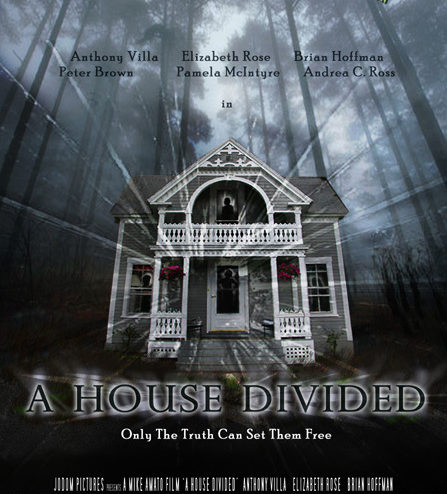
Emotion Pictures
Written by Mattias Frey | Posted by: Anonymous
Something supernatural must have come over Mike Amato while editing his wedding video. The self-described "Systems IT guy" had always been a movie buff, but it was while cutting the cinematic testament to his matrimonial vows that his filmmaking career was born. In November 2000 Amato founded Jodom Pictures, a production company which eschews "schmaltz, spoofs, and special effects," promising instead "just original, thought-provoking motion pictures that will keep you thinking long after the final credits have rolled."
Jodom Pictures has hitherto released three films, all made while Amato was still a vice president at a software company. "Kilroy Was Here" (2001), a semi-autobiographical comedy, chronicles the foibles and follies of a software sales executive at a crossroads in his life. Amato’s follow-up effort, "After Midnight" (2001) flirts with both the suspense and mystery genres, weaving an uncanny tale of lost memory, murder, and loss. "Limelight" (2003) investigates notions of celebrity and balancing fame with family.
Although each of these has been recognized with independent filmmaking awards, Amato is not above self-criticism when discussing his work and is quick to point out his early films’ flaws. "’Kilroy Was Here’ just wasn’t up to par in terms of lighting and sound. I can’t even sell it on my website because of legal issues with the soundtrack. And with ‘Limelight,’ the story probably could have been better. These are things you learn along the way."
In April 2003, Amato left his day job to become a full-time filmmaker. Five months later he started production on his latest feature, "A House Divided." Set to release in June "A House Divided" is a character-driven mystery-drama consisting of three stories told in flashbacks.
"It’s a whodunit in which a woman with multiple personalities who is married to a Kennedyesque senator gets involved in a murder investigation. We see her childhood and how each of her identities is formed. Then there’s a detective on the case whose own wife is schizophrenic." Even with all these twists, turns, and extraordinary situations Amato insists that his project revolves around a few questions. "When you get down to it it’s mainly a story about the meaning of love and what you would do for someone in trouble."
In addition to his filmmaking, Amato is also an articulate and passionate promoter of his craft. His website www.jodompictures.com features mission statements, manifestos, self-interviews, and words of advice to those who might follow his path. In spite of the site’s most incendiary claims that Jodom Pictures rejects "Hollywood glitz," Amato carefully distinguishes his filmmaking from both big budget pictures and other independent cinema.
"We’re not necessarily anti-Hollywood, but I don’t like what a lot of indie filmmakers do: they don’t take advantage of the beauty of independent film, that you can make a movie about what you want. We’re small and nimble. To us, the story is more important and we don’t do rip-offs."
Amato’s comments bear out through various trailers and teasers on his website. From these previews of coming attractions it is clear that the Jodom Pictures aesthetic has much more to do with Hollywood genre movies than with an experimental or art house cinema. Still, there is a way in which Amato’s style does attempt to negotiate a sincere relationship with the spectator. The Jodom Pictures motto, "we make moving pictures," testifies to the emotion the company tries to bring to audiences.
Indeed, according to Amato, producing feelings is where producing films leads. "I’m not looking to be a major independent. I just want people to see our films and get paid for it." However, the difficulty in reaching audiences is precisely what Amato bemoans about the current state of independent film. "Whereas with the digital medium it is easier to make money because it is so cheap, distribution is very hard. You always need to think about quality too. There are so many bad films out there because a lot of filmmakers don’t realize that you still need a solid story and production values."
Amato credits websites like www.microcinema.com and www.rewindvideo.com with helping him exchange ideas and cites Mindscape, Random Foo, and Moodystreet as other independent production outfits with which he has worked or discussed projects. "Networking is very important. I’ve also had a lot of success networking through actors."
The New England film scene offers its own matrix of advantages and challenges for Amato. "It’s tough to make studio pictures here because it’s so expensive. At this point most go to Toronto if they want the ‘New England feel’–a movie like ‘Mystic River’ was a big exception and I applaud Clint Eastwood for shooting in Boston. It’s a shame that more directors don’t do the same because the acting community is so strong here. We went through a lengthy audition process for ‘A House Divided’ and were able to get the best quality actors that are out there. There’s big potential here, but the main problem is cost."
When asked about possible advice for aspiring directors, Amato responded with the weariness of a soldier still battling on the front lines. "It’s hard to recommend this path, you just have to love it. People will tell you to give up, especially if you’re like me and have no film school background. But the best way is to make films. Don’t just talk about making films — the best thing is experience. I’ve learned that in the end it’s the little things that add up to make a quality film — the lighting, the sound. In the end I encourage people to just go for it. Don’t wait for all the planets to be aligned."
'A House Divided' opens June 12th. For more information or to view the trailer, see www.jodompictures.com.










